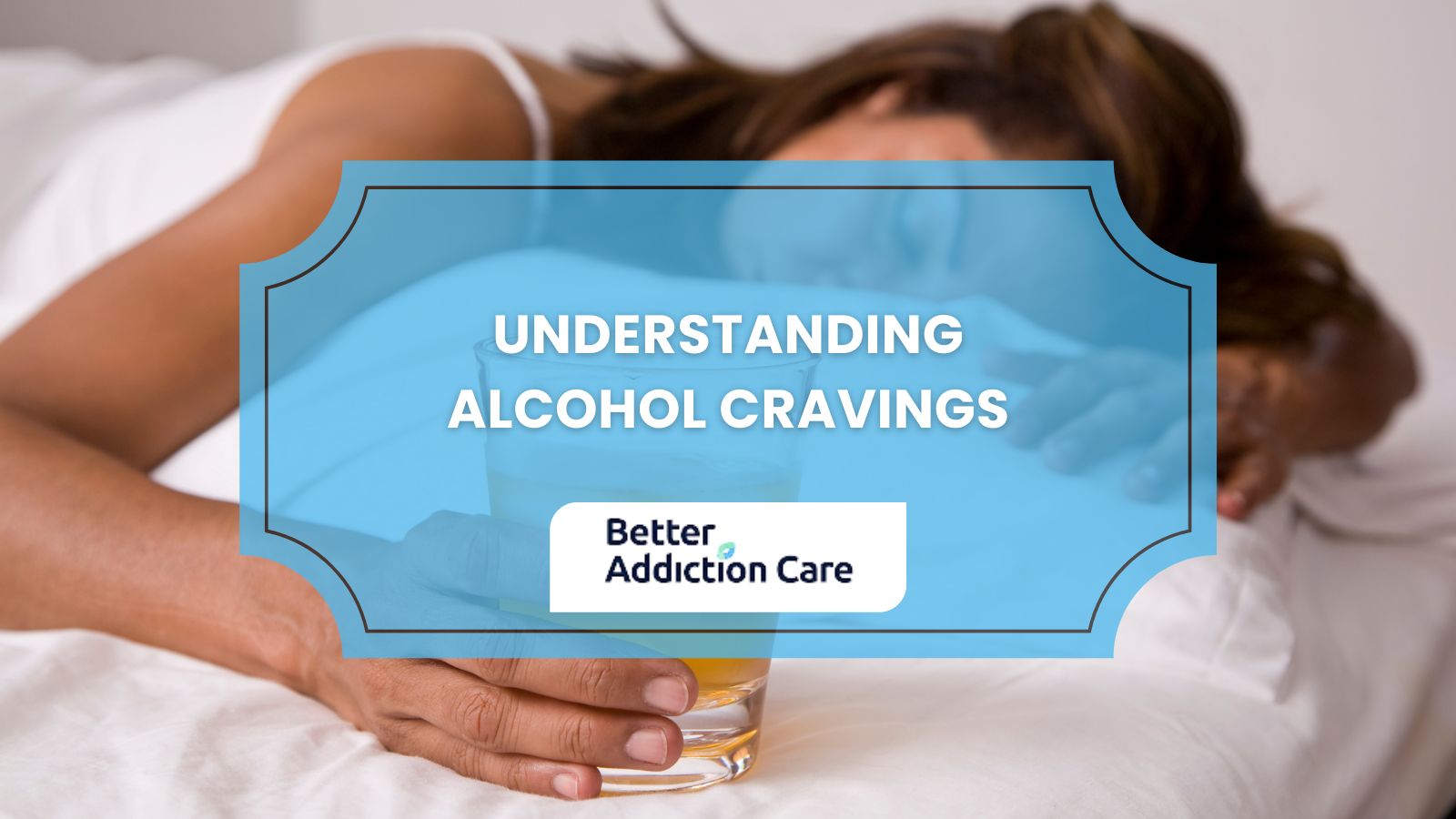How to Recognize a Functional Alcoholic: 10 Signs of a Functional Alcoholic.
To recognize a functional alcoholic, look for consistent drinking, isolation, solo alcohol use, increased tolerance, withdrawal symptoms, defensiveness about drinking, prioritization of alcohol over responsibilities, rationalization of use, physical changes, and memory issues.
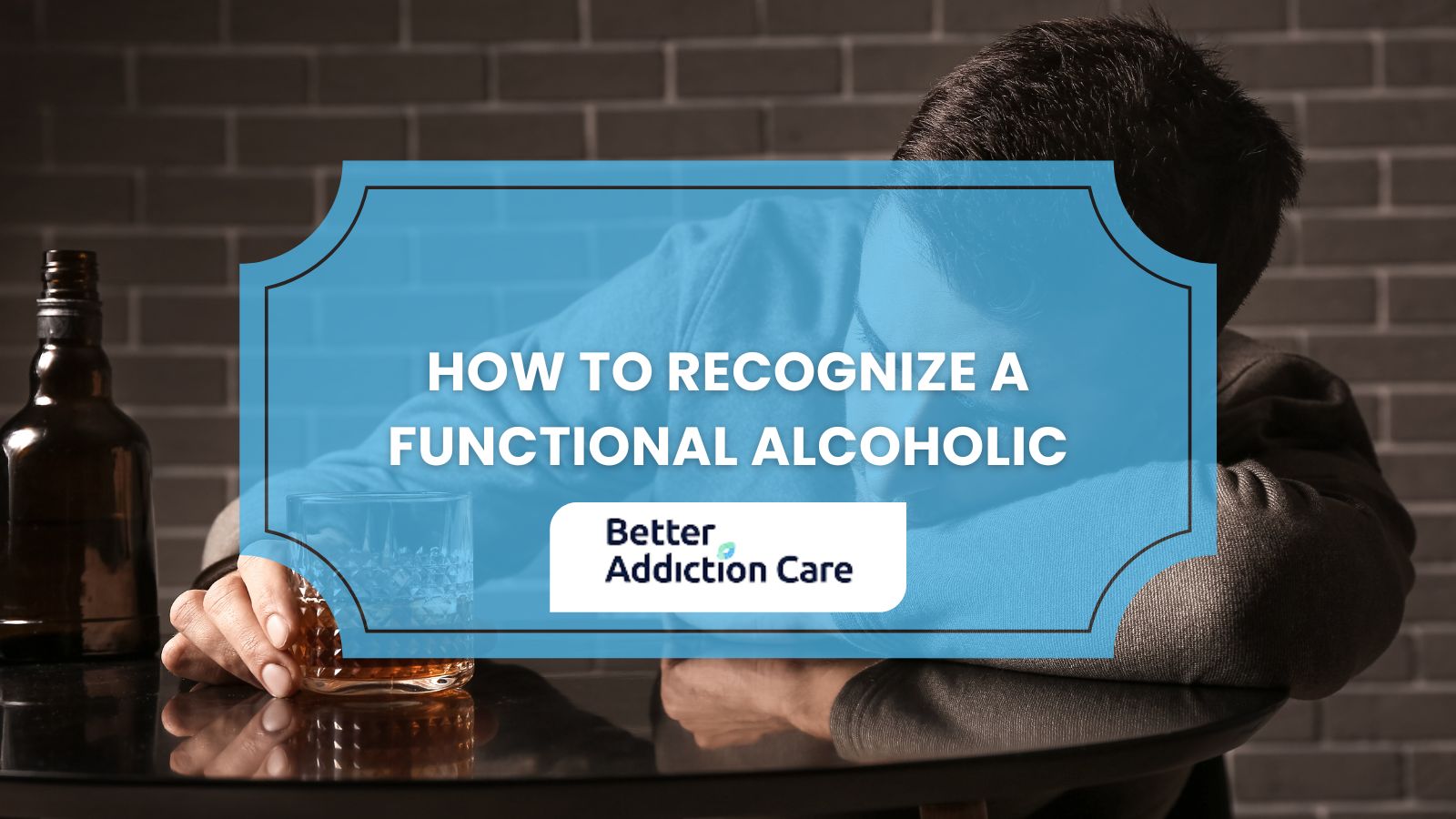
To recognize a functional alcoholic, look for consistent drinking, isolation, solo alcohol use, increased tolerance, withdrawal symptoms, defensiveness about drinking, prioritization of alcohol over responsibilities, rationalization of use, physical changes, and memory issues.
A functional alcoholic is someone who keeps functioning normally even when they have an alcohol problem. Despite heavy drinking, they fulfill their duties at home, in relationships, and on the job. Even so, there are small signs of abuse.
According to research by the National Institute on Alcohol Abuse and Alcoholism, functional alcoholics make up 19.5% of all U.S. alcoholics. These individuals are typically middle-aged, well-educated, with stable jobs and families, contradicting the stereotype of what an alcoholic looks like.
It is possible to recover, and there are different treatment options. If we want to help someone stop drinking, we need first to figure out what signs they are showing, offer them help, and conduct an intervention if necessary.
What Are the Signs to Recognize a Functional Alcoholic?
The signs of a functional alcoholic include increased isolation, consistent drinking, solo drinking, high tolerance, withdrawal symptoms, defensive behavior, prioritizing alcohol, rationalization, physical changes, and memory issues.
Recognizing a functional alcoholic presents unique challenges because these individuals maintain their daily responsibilities while struggling with alcohol dependence. Functional alcoholics balance their regular drinking patterns with their jobs, relationships, and other obligations, making their condition difficult to detect.
Listed below are 10 common signs to recognize a functional alcoholic.
- Increased Isolation: Withdrawal from social or family interactions, preferring to drink alone.
- Consistent Drinking: Regular alcohol use regardless of setting or occasion.
- Solo Drinking: Consuming alcohol in solitude as a routine coping mechanism.
- High Tolerance: Needs more alcohol to achieve the same effect due to prolonged use.
- Withdrawal Symptoms: Physical discomfort or mood changes when not drinking.
- Defensive Behavior: Reacting angrily or dismissively when questioned about drinking habits.
- Prioritizing Alcohol: Placing drinking above responsibilities, relationships, or health.
- Rationalization: Justifying alcohol use despite negative consequences.
- Physical Changes: Noticeable signs such as weight fluctuations, poor hygiene, or fatigue.
- Memory Issues: Experiencing blackouts or difficulty recalling events tied to drinking.
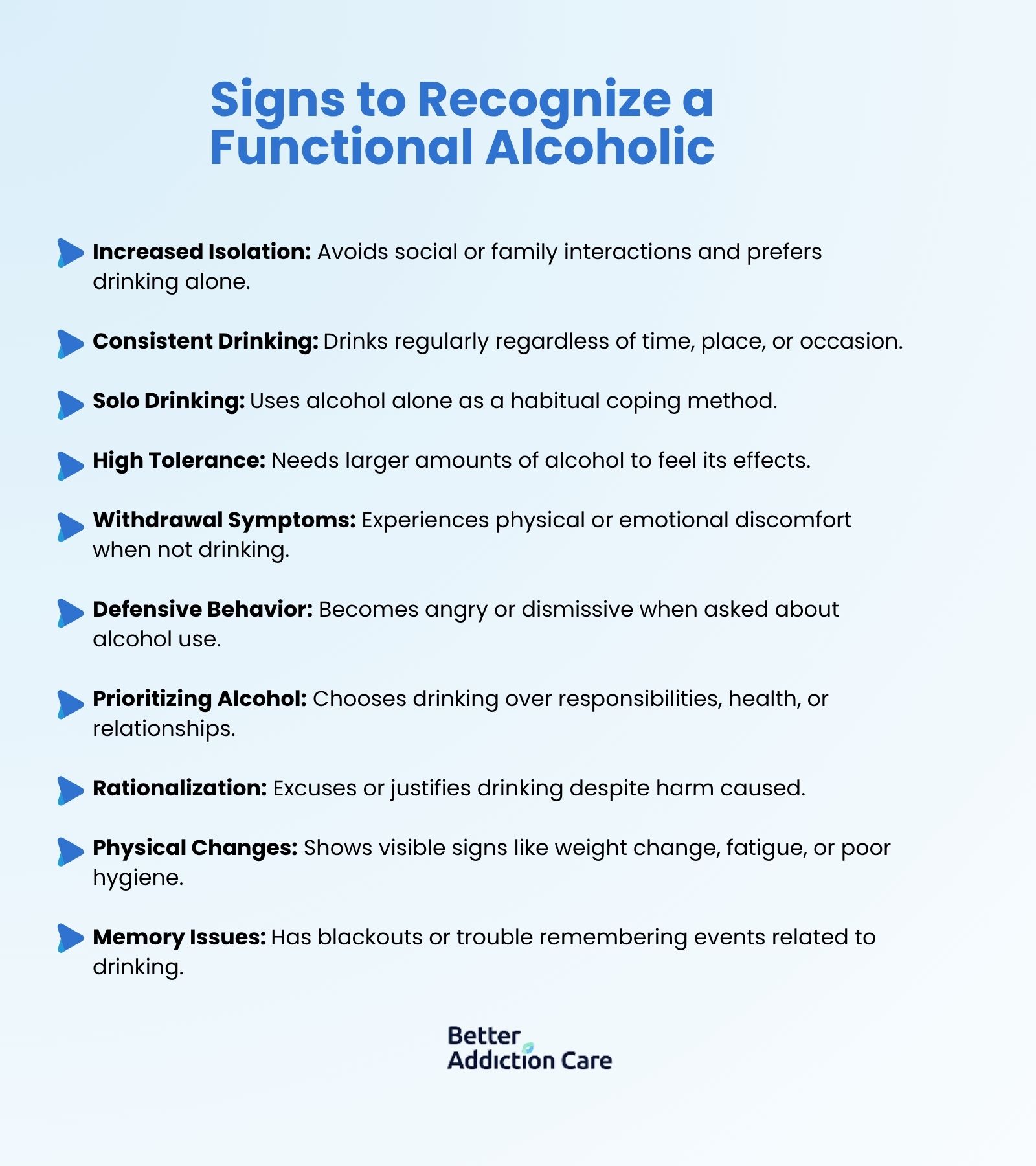
What Is Functional Tolerance?
Functional tolerance is when the body adapts to the effects of alcohol over time so that the same amount of alcohol has less of an impact on it. This type of tolerance develops when a person consumes alcohol regularly, causing their body to become accustomed to alcohol and less sensitive to its effects. As functional tolerance increases, individuals need larger amounts of alcohol to achieve the same effects they previously experienced with smaller amounts.
There are several ways that functional tolerance shows up:
-
Behavioral Tolerance: You appear less impaired by alcohol despite consuming the same amount. You perform tasks, such as driving, that become challenging when intoxicated.
-
Metabolic Tolerance: Continued alcohol consumption enhances your body’s ability to metabolize alcohol. This improvement lowers your blood alcohol level and reduces the duration of intoxication.
-
Cellular Adaptation: Long-term alcohol consumption alters your brain's neurochemistry and cellular structure, reducing tolerance. These changes affect neurotransmitter levels and receptor sensitivity.
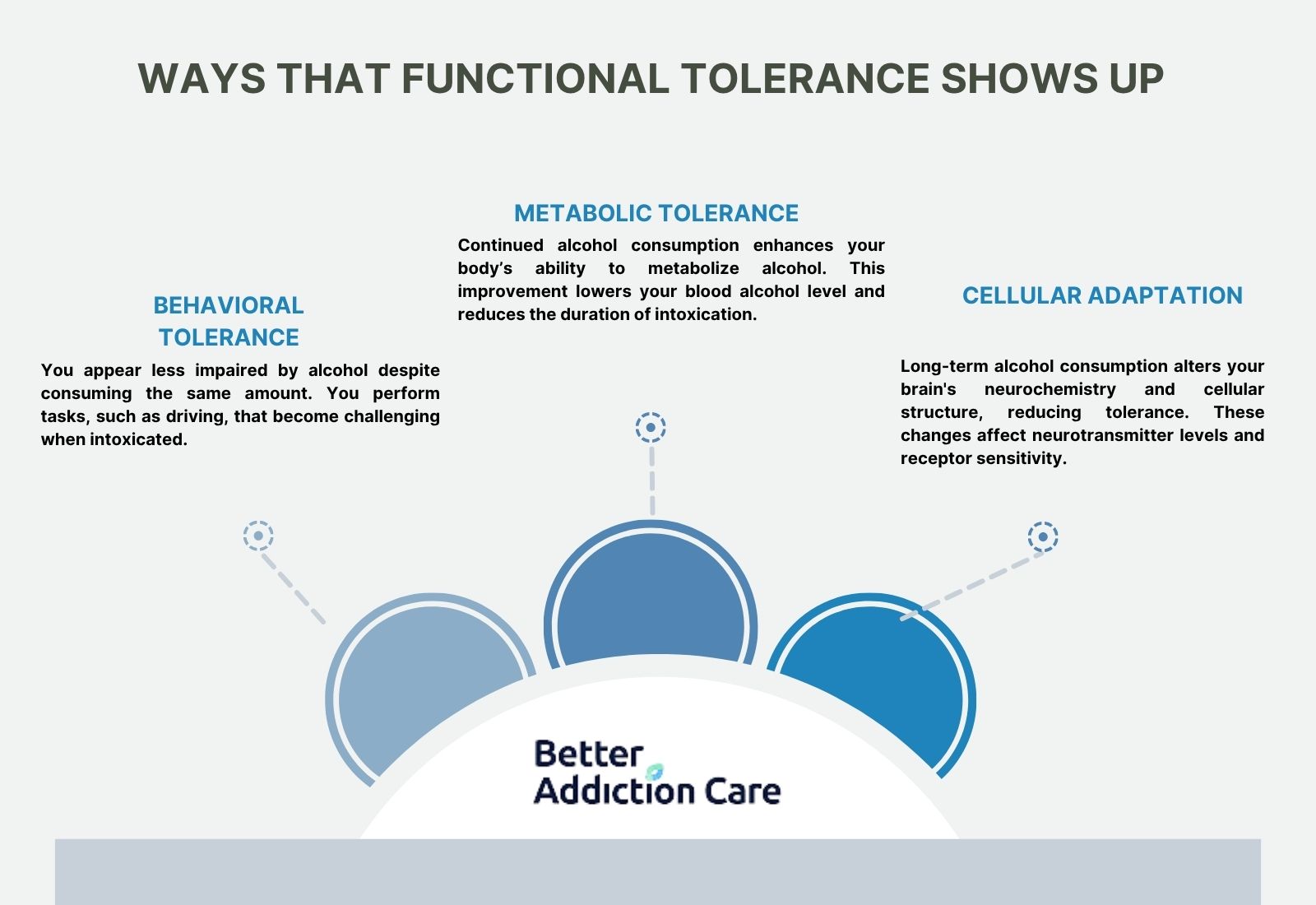
Does Functional Tolerance Increase The Risk Of Alcohol Addiction?
Yes, functional tolerance significantly increases the risk of alcohol addiction by creating a dangerous cycle that leads to progressively heavier drinking patterns.
Functional tolerance occurs when the brain adapts to regular alcohol consumption, allowing individuals to appear normal despite high blood alcohol levels. While this might seem advantageous, it masks impairment severity and encourages continued drinking. As tolerance builds, people need increasingly larger amounts of alcohol to achieve the same effects, directly correlating with higher addiction risk.
The most concerning aspect is that functional tolerance creates a false sense of control. Individuals believe they "handle their alcohol" better than others, leading to more frequent and heavier drinking. This pattern of increased consumption, combined with the brain's neurochemical adaptations, significantly raises the likelihood of developing alcohol addiction. The tolerance essentially becomes a gateway to dependency, as the body becomes accustomed to functioning with alcohol and begins requiring it for normal operation.
Is a Functional Alcoholic Someone in Denial?
No, a functional alcoholic is not always someone in denial. While denial is common among some drinkers, not all functional alcoholics exhibit this behavior.
Functional alcoholics rationalize their drinking habits but are not necessarily in denial about alcohol's impact on their lives. Many know they have a problem but cannot stop due to fear of judgment, embarrassment, or the belief that they control their drinking.
Denial worsens alcoholism because people lie about their drinking, downplay negative effects, or refuse to admit they have a problem. This protection mechanism contributes to the progression of severe alcoholism.
What Are The Risks of Being a Functional Alcoholic?
The risks of being a functional alcoholic include serious health issues, mental health disorders, impaired relationships, financial problems, legal consequences, and declining work performance. Despite appearing stable, functional alcoholics face liver damage, heart disease, neurological impairment, and weakened immunity. Alcohol abuse worsens anxiety, depression, and other mental illnesses. It also leads to poor decision-making that harms personal relationships. Financial strain occurs as money is diverted to support drinking habits, while legal troubles like DUI charges threaten both personal and professional life. Over time, even if work performance seems unaffected, the cumulative effects of alcohol take a toll.
Am I a Functional Alcoholic?
You are a functional alcoholic if you maintain your daily responsibilities while struggling with alcohol dependency. To determine if you might be a functional alcoholic, you need to look at different parts of your drinking carefully and how it affects your life. In this case, the CAGE assessment is a useful tool for self-evaluation.
Questions from the CAGE are listed below.
- Have you ever felt the need to cut down on your drinking?
- Have you ever felt annoyed by criticism of your drinking habits?
- Have you ever felt Guilty about your drinking behavior?
- Have you ever needed an Eye-opener or a drink to steady your nerves in the morning?
Think about how you answered these questions. Think about whether you usually drink more alcohol than you mean to, whether you have cravings for alcohol, or whether you find it hard to stop drinking even though you know it's bad for you.
Consider the detrimental effects of alcohol consumption on your life, your social interactions, and your professional and academic endeavors, because if you answered "yes" to the previous questions, but at the same time, your normal life is not affected, then you probably are a functional alcoholic. It is imperative to document any dangerous behavior in which you engaged while intoxicated.
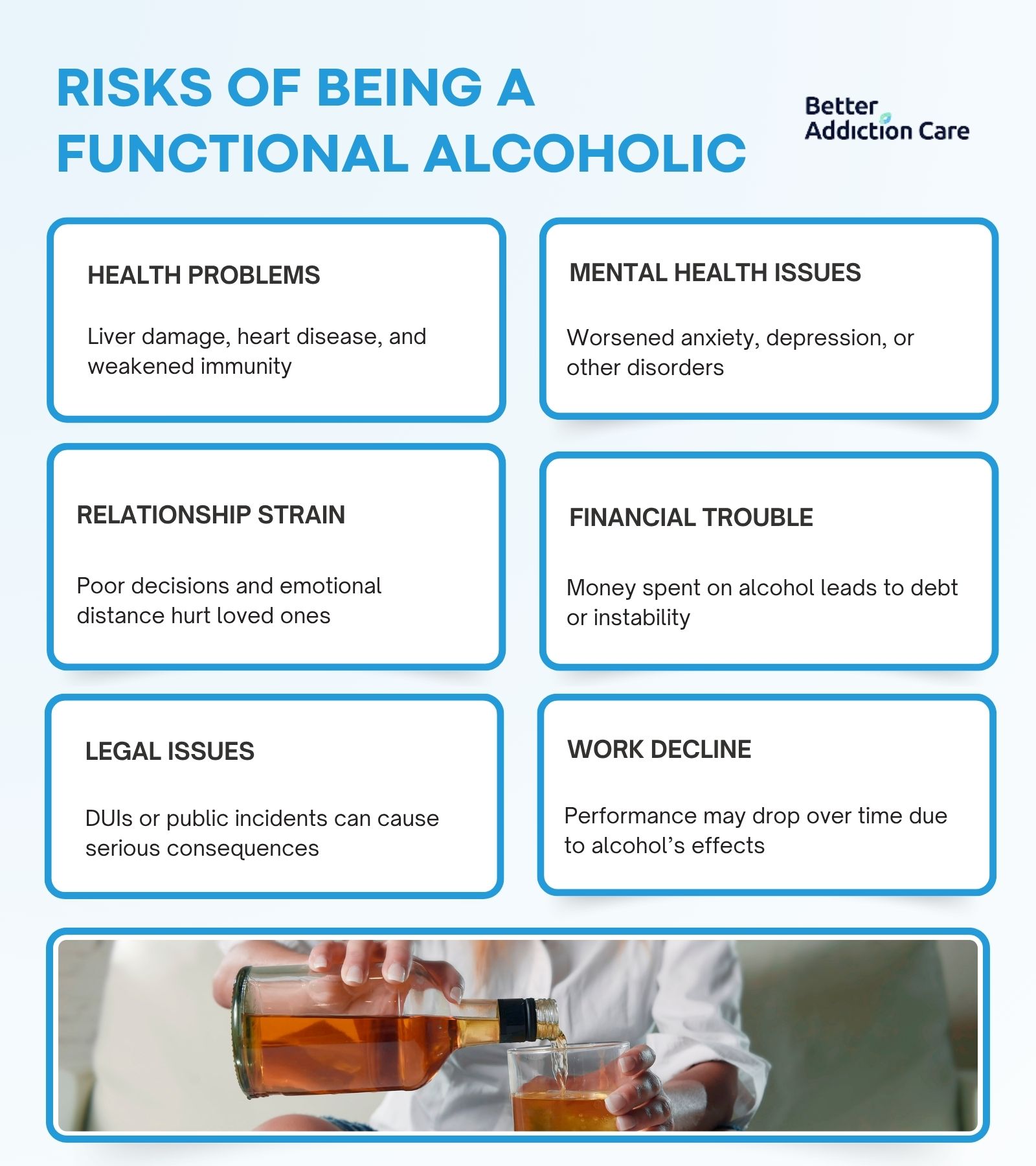
Do Functional Alcohol Users Need Professional Addiction Treatment Strategies?
Functional alcohol users do need professional addiction treatment strategies because their drinking causes serious health and life problems despite outward appearances. Seeking strategies for successful addiction treatment provides personalized support, accurate diagnosis, and effective tools to overcome addiction and make lasting positive changes. Professional treatment addresses both the physical and psychological aspects of alcoholism, improving chances of recovery.
What Are The Signs That A Functional Alcoholic Needs To Find AA Meetings?
Signs that a functional alcoholic needs to find AA meetings include drinking alone or secretly, using alcohol to cope with stress, increasing tolerance, making excuses for drinking, experiencing withdrawal symptoms, and facing negative consequences like legal or health problems. When you recognize these signs, find AA meetings near you to
break the cycle of addiction and start recovery through support and accountability.
How Can Someone Get Help For Functional Alcoholism From Local Alcohol Rehab Facilities?
To get help for functional alcoholism from local alcohol rehab facilities, start by recognizing the signs, such as drinking to cope, increased tolerance, or hiding use, and reach out to addiction professionals. Local rehab centers offer inpatient and outpatient programs with therapy and support tailored to individual needs.
At Better Addiction Care, we help connect individuals with a local alcohol rehab facility that provides structured treatment and professional guidance. Our network includes rehab centers designed to fit different lifestyles while offering the tools and support needed for long-term recovery.
By choosing a nearby facility, individuals reduce exposure to triggers and gain access to community-based recovery resources that reinforce lasting change.





